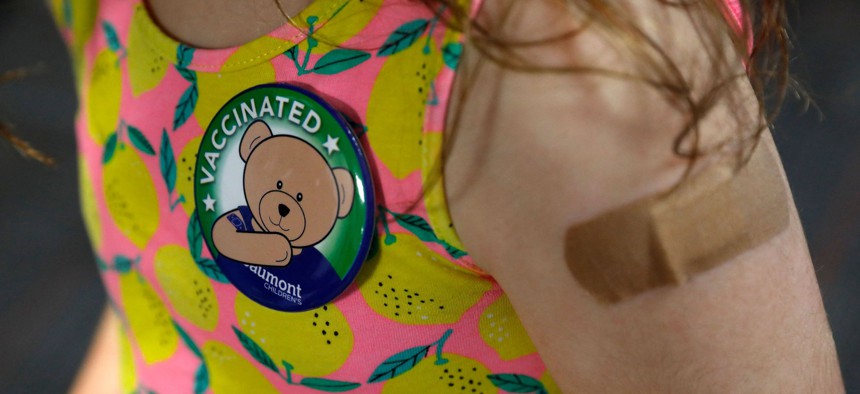CDC to reduce funding for states’ child vaccination programs

EFF KOWALSKY/AFP via Getty Images
Citing the recent debt ceiling deal, the CDC is trimming its funding to child vaccination programs that focus on communities vulnerable to disease outbreaks. The cuts come despite data showing the percentage of children getting vaccinated has dropped in recent years.
This story was first published by KFF Health News. Read the original article here.
The Centers for Disease Control and Prevention is reducing funding to states for child vaccination programs, according to an agency email obtained by KFF Health News.
The funding cut “is a significant change to your budget,” said the email to immunization managers, dated June 27 and signed by two CDC officials.
The immunization managers who received the message are public health officials who direct state, territorial, and local programs to promote vaccinations against a variety of infectious diseases, such as measles and chickenpox.
The reduction comes from a federal immunization grant—totaling about $680 million in the latest year—that supports vaccination programs for children, according to the Association of Immunization Managers.
“There will be no easy solution for this,” said the CDC email. “We know that this change will require some tough decisions.”
When asked about the change, CDC spokesperson Kristen Nordlund said Monday, “The budgetary impact is still being worked out.”
Agency officials linked the reduction to the debt ceiling deal recently struck by the Biden administration and Congress. The cut may result in less complete reporting on vaccinations, the CDC said.
The debt deal rescinded about $27 billion in unspent federal money that had been allocated to fight covid. It also led the CDC to remove $400 million in funding to states for workers who fight the spread of sexually transmitted infections, according to an email obtained by CQ Roll Call.
Claire Hannan, executive director of the Association of Immunization Managers, said Wednesday that jurisdictions are reporting that the cut amounts to 10% or more of their previous year’s award.
The targeted cut will affect programs that identify communities vulnerable to disease outbreaks, said Hannan. This information is used to prevent and manage outbreaks, Hannan added.
States and territories, along with a few cities, are expected to learn their federal funding amounts for child immunization this week, Hannan said.
A spokesperson for the Georgia Department of Public Health, Nancy Nydam, acknowledged that a funding cut for child immunizations was coming but said the agency hadn’t received additional details as of Monday afternoon.
The budget cut comes as the number of children getting vaccinated dropped amid the covid pandemic. During the 2021-22 school year, approximately 93% of kindergartners nationwide received each of the MMR (measles, mumps, and rubella), DTaP (diphtheria, tetanus, and acellular pertussis), polio, and varicella vaccines. That was down from 94% during the 2020-21 school year and 95% coverage during 2019-20.
Children who are not vaccinated are more likely to get diseases like measles and whooping cough, the CDC points out on its website. Outbreaks of these diseases have occurred recently, especially in communities with low vaccination rates.
“Now is not the time to reduce federal support for routine childhood vaccine administration,” said Mark Del Monte, CEO of the American Academy of Pediatrics. “We need to make sure every child remains fully up to date on their vaccinations as we approach back-to-school season, and that requires sustained investments in the vaccine delivery system.”
Shifting money from one area to another isn’t easy because of rigidity in the CDC’s budget, said Georges Benjamin, executive director of the American Public Health Association.
Local public health agencies depend on federal funding to support their immunization programs, Benjamin said. He worries low-income families are especially vulnerable if local departments face budget cuts.
“This is what happens when you don’t pay attention to public health,” Benjamin said.





